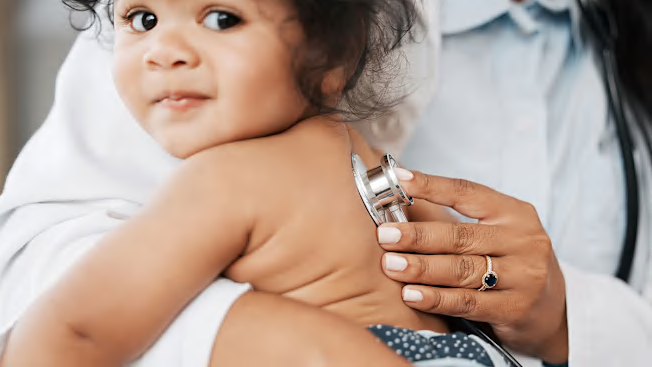Should Your Baby Get a Measles Vaccine Early?
The disease is on the rise in the U.S. Experts explain when parents should consider the shot before a baby turns 1.

With the measles outbreak in the U.S. that began in Texas still spreading, many parents are on high alert. Rightfully so: Measles is one of the most contagious diseases we know of. The virus that causes it can linger in the air for up to 2 hours. And an infection can cause serious illness that may result in hospitalization or death, especially in young children. So far this year, nearly a quarter of those under 5 who have gotten measles have been hospitalized.
Experts agree that the best way to protect your child from infection is by making sure they get the measles, mumps, and rubella vaccine (MMR). In the current outbreak, about 97 percent of those who have been infected were unvaccinated or their vaccination status was unknown.
What’s concerning for some parents is that measles can be particularly dangerous for babies, who are also typically among the unvaccinated. Most don’t get an MMR shot until they’re at least 12 months old. That’s because the Centers for Disease Control and Prevention recommends a first dose at 12 to 15 months, followed by a second between ages 4 and 6.
For most children, it makes sense to stick to the regular schedule, even when cases are higher than usual nationally. But in some situations, experts recommend an MMR shot for babies as young as 6 months. Here’s what to know.
Why Most Parents Should Wait
The MMR vaccine isn’t generally recommended before 12 months because it’s not clear how effective and lasting it is in younger babies, says Michael Chang, MD, a pediatric infectious disease physician at UTHealth Houston.
There are two main reasons to wait until a child turns 1. For one, during the first several months of an infant’s life, they have antibodies from their mother’s immunizations. Those may render a shot somewhat less effective and also may not be enough to be protective, Chang says. And the immune system’s ability to create antibodies from vaccination is stronger after a child is 12 months old.
If There's an Outbreak in Your Community
If you live in an area with an active measles outbreak—defined as three or more related case—or if you can’t avoid travel to a region with an active outbreak, then your 6- to 12-month-old child should get the vaccine early.
Do you also have an older child? If they have already received one dose, Chang says they can get the second dose before they turn 4 as long as it has been at least 28 days since the first one.
If You're Traveling Internationally
The CDC recommends that all babies between 6 and 12 months who are traveling anywhere outside the U.S. get an MMR shot at least two weeks before the trip. That’s because although high vaccination rates in the U.S. mean that measles is no longer considered endemic here (at least for now), it still circulates regularly in many countries that have lower vaccination rates.
If Your Child Has Been Exposed to Measles
When someone has a diagnosed case of measles, the local health department will typically try to alert people who have been exposed to them and recommend the next steps.
“If your child was exposed to measles, depending on the age of the child, vaccination status, and days since exposure, they may get either a vaccine or immunoglobulin as protection,” says Melissa Stockwell, MD, MPH, chief of the division of child and adolescent health and a professor of pediatrics and population and family health at Columbia University.
Immunoglobulin, proteins produced by the human immune system to fight off measles (and other pathogens), can be injected to help a child’s body mount a defense against the virus very quickly, while an early vaccine can help a child’s immune system produce those proteins on its own.
When an unvaccinated baby between 6 and 12 months is exposed to measles, doctors usually recommend an early MMR vaccine within 72 hours of the exposure. If more time has passed since then, a shot of immunoglobulin is recommended within four to six days after exposure. For babies under 6 months, a shot of immunoglobulin is the standard recommendation, within six days of exposure. “After six days, it’s not likely the extra antibodies will help that much,” Chang says. (Measles symptoms usually show up seven to 14 days after exposure.)
If you’re not sure whether your baby should get an early MMR vaccine or you have other questions about measles, your child’s pediatrician is the best resource.
Vaccines, just like medications, can cause side effects, Stockwell says. But the MMR vaccine “is a very effective vaccine with a well-established safety record,” she says, and getting it “is much safer than getting measles itself.”

